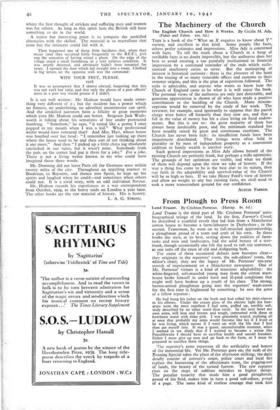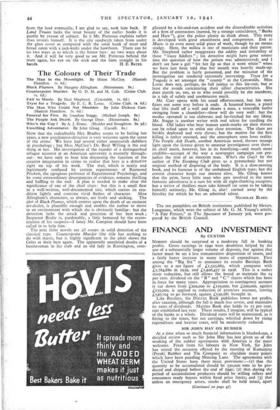From Plough to Press Room
Land Truant. By Crichton Porteous. (Harrap. 8s. 6d.) Land Truant is the third part of Mr. Crichton Porteous' auto- biographical trilogy of the land. In the first, Farmer's Creed, he described a youthful revolt that led him from a Manchester cotton house to become a farm-labourer in Derbyshire ; in the second, Teamsman, he went on to full-muscled apprenticeship, a ploughman proud of a team and craft of his own. In these books the style, at its best, setting down the realities of farm- tasks and men and landscapes, had the solid beauty of a tree- trunk, though occasionally one felt the need to rub out sentences, as one rubs off the crust of old and disfiguring bark.
The cause of these occasional defects now becomes clear— they originate in the reporters' room, the sub-editors' room, the editor's chair; they are the legacy of Mr. Porteous' ten-year stretch of imprisonment on a Manchester newspaper. One of Mr. Porteous' virtues is a kind of tenacious adaptability: the white-fingered, soft-muscled young man from the cotton ware- house broke himself in under hard and ill-paid conditions that might well have broken up a youth of his class. The strong, brown-armed ploughman going into the reporters' wash-room for the first time is frightened by something : he sees the arms of a fellow reporter :
He had hung his jacket on the hook and had rolled his shirt-sleeves to his elbows. Under the cream glass of the electric light his fore- arms were the most repellent I had seen, puffed up, terribly soft, truly described by no other word than tardy. In the next bowl my own arms, still lean and brown and tough, contrasted with them as hawthorn wood with elder pith. I was genuinely scared, realising all at once that probably my arms would become like his if I lived as he was living, which meant if I went on with the life that I had then got myself into. It was a queer, uncomfortable moment, when I seemed to see dimly that if I wanted to become a writer like Posselthwaite I should have to sacrifice health and untold freedom. Either I must give up now and go back to the farm, or I must be prepared to sacrifice these things.
The reporter's arms represent all the artificiality and horror of the inessential life. Yet Mr. Porteous goes on; the rush of the Evening Special takes the place of the afternoon milking; the daily deadly routine of coroner's court, police court and local fire replace the harnessing of the affectionate team, the pegging-out of lands, the beauty of the turned furrow. file raw reporter rises on the steps of sublime mistakes to higher things. The peculiar tenacity that made him a good ploughman, proud of his field, makes him in turn a good sub-editor, proud of a page. The same kind of restless courage that took him from the land eventually, I am glad to say, took him back. If Land Truant lacks the stout beauty of the earlier books it is purely by reason of subject. In it Mr. Porteous explains rather than reveals himself. It is the city sandwich taken from under the glass cover as compared with the solid hunk of meat and bread eaten with a jack-knife under the hawthorn. There can be no two ways as to which is the better fare : no two ways about it. And it will be very good to see Mr. Porteous behind the team again, his eye on the stick and the lines straight in his



























 Previous page
Previous page